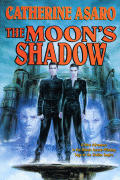
| Series: | Skolian Empire #8 |
| Publisher: | Tor |
| Copyright: | March 2003 |
| ISBN: | 0-765-30425-2 |
| Format: | Hardcover |
| Pages: | 480 |
Note that this is the eighth book of the Skolian Empire series and should not be read without reading the prior books.
Asaro had been flirting with McCaffrey syndrome at various points earlier in this series, but unfortunately in this book she smashed right into it in a particularly uninteresting way.
McCaffrey syndrome, a term invented by yours truly and probably not used by anyone else at all, is the habit of a writer with a long on-going series to start telling the same story over and over again from different perspectives. And by this, I don't mean using the same basic plot and tropes, like David Eddings did. I mean literally the same events, just told from the perspective of a different character. It's named the McCaffrey syndrome because far and away the worst example of it that I've ever seen (sufficient to make the series unreadable for me) was in the Rowan / Damia series by Anne McCaffrey (she also does it quite a bit in the Pern series).
This book suffers from it badly. It wasn't until after page 60 that anything actually new happened, and the reader was still being treated to scenes from Spherical Harmonic well after page 200. If the retellings were from a truly radically different perspective, this might still be interesting, but... they're not. I learned nothing about the thoughts of the other characters involved that I hadn't already figured out from the subtext the first time around. Besides, let me point out that most of these characters are telepaths, which means that we got quite a bit of the perspective of the other characters involved the first time we saw each scene.
Also present was another common series malady, the awkward and ham-handed refresher on all of the core concepts of the world. We find out again who the Traders are, what the Ruby Dynasty is, and who all the players are, although at least we're spared the description of how telepathy works this time. Even when well-done, this is frustrating, and unfortunately Asaro is not particularly good at it. The explanation tends to be delivered as a lecture by the narrator, with about as much subtlety as a bag of bricks, and without even approaching the explanation from a different angle than it was approached in all the previous books of the series.
Bleh.
Once you excise the above from the book and get down to the original content, it's a fairly decent book about the intrigues of Trader (Eubian) society, but has nothing to particularly distinguish it. The overall series plot is advanced somewhat, and satisfactorily for as far as it goes, but there isn't much in the way of a real payoff. The story feels like it's constantly flirting with true significance, but then backs away again.
After Spherical Harmonic, it was a disappointment. If you've gotten this far in the series, you're still going to want to read it to find out what happens next, but if you're like me, you're going to be really hoping that the next book is better.
The next book in the series is Skyfall, but it's a prequel to the whole series rather than a continuation of the story.
Reviewed: 2004-02-24